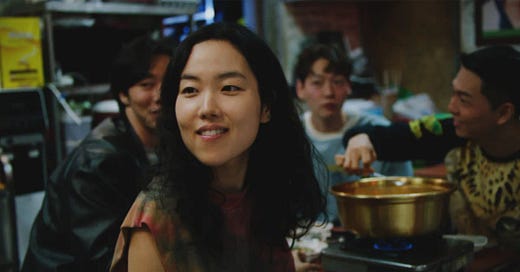The Boston Society of Film Critics, a reasonably august 30-member body to which I’ve belonged for almost 20 years now, held their annual awards meeting on Sunday, a hybrid in-person/Zoom affair that took up most of the day and saw some contentious discussions and felicitous votes. The BSFC was formed in 1981 – first Best Picture winner, 1980’s “Raging Bull” – and in its four decades of existence has served as a bellwether for whichever way the awards-season wind ends up blowing. We’re not the first of the critics’ groups to meet (the New York Film Critics Circle and the Gotham Awards, among others, meet ahead of us), but we help solidify the field and confirm early breakouts: The 2021 Boston choice for Best Picture, Ryûsuke Hamaguchi’s “Drive My Car,” seemed a fluky choice at the time but went on to be nominated for four Academy Awards, including best picture, and won the prize for best international film.
Similarly, this year’s winner is a dark horse: Davy Chou’s “Return to Seoul” premiered at Cannes in May but didn’t make much of an impression on US critics before its appearance at the New York Film Festival in October; even with an Oscar-qualifying opening Dec. 1 in New York and L.A., it has been slow to appear on many people’s radar. I watched it last week as part of my pre-meeting due diligence and was gobsmacked by a tough, tender, gorgeously filmed tale of a troubled young Korean woman — adopted and raised in France — and her self-destructive collision with a home culture she understands not at all. As BSFC member Gerry Peary astutely pointed out in his pre-voting defense of the film, “Return to Seoul” has echoes of classic women’s films Asian (Japan’s Mizoguchi), American (Douglas Sirk), and French (Godard would have loved lead actress Park Ji-min, above), while feeling restlessly and relentlessly modern. I’m glad we picked it as the year’s best, but since it won’t have a general theatrical release until late February of 2023, I’m frustrated that you folks won’t have a crack at it for another two months. Is distributor Sony Pictures Classics playing the Oscar-nomination long game or just throwing the movie away?
Anyway, here's the full list of awards, with a few relevant notes.
Best Film: “Return to Seoul”
Best English-language Film: “The Banshees of Inisherin”
The BSFC traditionally votes on the year’s best film first and then, if an English-language film wins, proceeds to vote for best international film. But if an international film wins, as has happened for the past two years, we then vote on the best English-language film. Quixotic, but there you are. The other critics group to which I belong, The National Society of Film Critics (which meets in early January), does it differently: If an international film wins best picture, the NSFC doesn’t vote on a subsequent English-language film or another “best international film.” They just let the best picture be the best picture. Which, honestly, makes more sense to me.
Best Director: Todd Field, “Tár”
Best Ensemble Cast: TIE between “Women Talking” and “Jackass Forever”
This was the contentious one, and there were people in the room – partisans of Sarah Polley’s devastating drama about a Mennonite community coping with an epidemic of rape – who were distressed that we would even be discussing these two films together in the same sentence, let alone the same category. But the “Jackass” backers made a compelling case that the film’s non-actor performers constituted a legitimately prizeworthy group (and note that the award is for best ensemble cast, not best ensemble acting). I confess I played a part in creating the situation for a tied vote, and for that I will probably be going to hell.
Best Actor: Colin Farrell, for his performances in both “The Banshees of Inisherin” and “After Yang”
The actor is also quite good in Ron Howard’s “Thirteen Lives” and thoroughly unrecognizable as the Penguin in “The Batman,” but we had to draw the line somewhere.
Best Supporting Actor: Ke Huy Quan, “Everything Everywhere All at Once”
Love this award and the return of Quan as a pop-culture redemption story (he’s not redeemed by his comeback – we are). But Barry Keoghan was a close runner-up as the village idiot in “The Banshees of Inisherin,” and I would’ve been okay with that, too.
Best Actress: Michelle Yeoh, “Everything Everywhere All at Once”
From here to the stage of the Academy Awards, if there’s any justice.
Best Supporting Actress: Kerry Condon, “The Banshees of Inisherin”
Dolly de Leon, so good in “Triangle of Sadness,” was the runner-up.
Best Adapted Screenplay: “After Yang,” Kogonada, from a short story by Alexander Weinstein
Best Original Screenplay: “The Banshees of Inisherin,” Martin McDonagh
Best New Filmmaker (awarded in memory of film critic and BSFC member David Brudnoy): Charlotte Wells, “Aftersun”
Best Documentary (awarded in memory of filmmaker Lucia Small): “All the Beauty and the Bloodshed”
Excellent film, as is the runner-up, “All That Breathes.”
Best Animation: “Turning Red”
Pixar strikes again.
Best Cinematography: Eliot Rockett, for his camerawork in Ti West’s horror diptych, “X” and “Pearl.”
Best Editing (awarded in memory of film editor Karen Schmeer): TIE between “Decision to Leave” (Kim Sang-beom) and “Aftersun” (Blair McClendon)
Best Original Score: “RRR” (M.M. Keeravani)
Thoughts? Comments? Don’t hesitate to share.
If you enjoyed this edition of Ty Burr’s Watch List, please feel free to pass it along to friends.
If you’re not a paying subscriber and would like to sign up for additional postings and to join the discussions, here’s how:
One more thing: The holidays are coming, and what better gift for the movie-besotted loved one on your list than a year’s subscription to Ty Burr’s Watch List?




